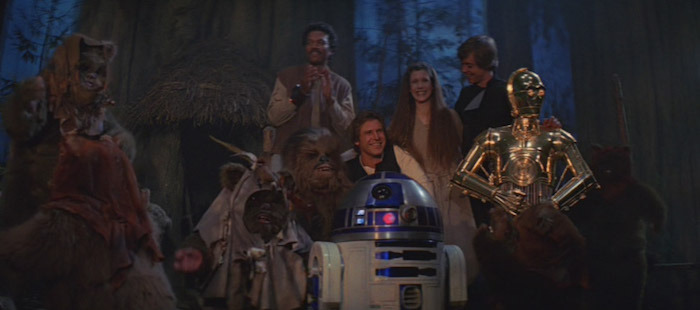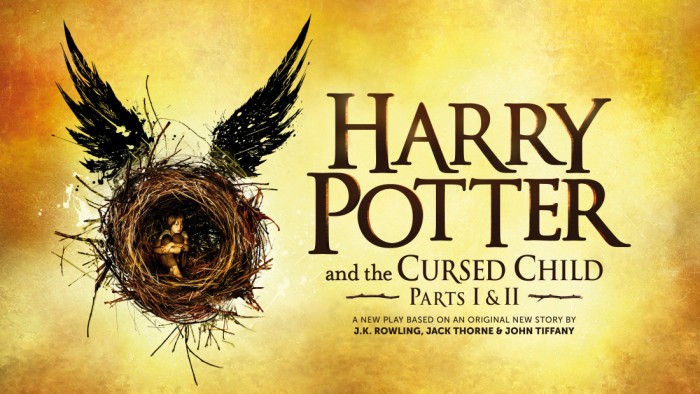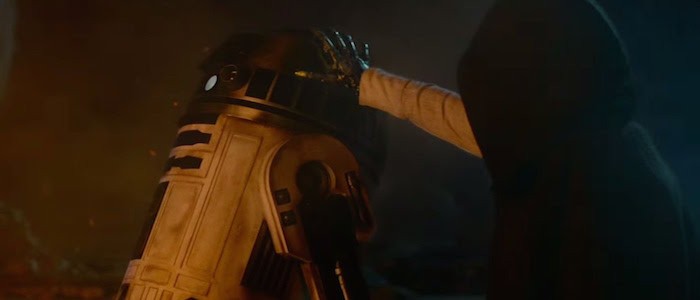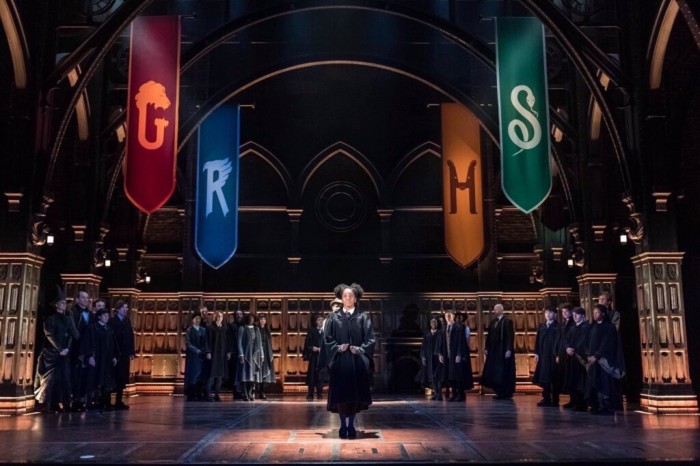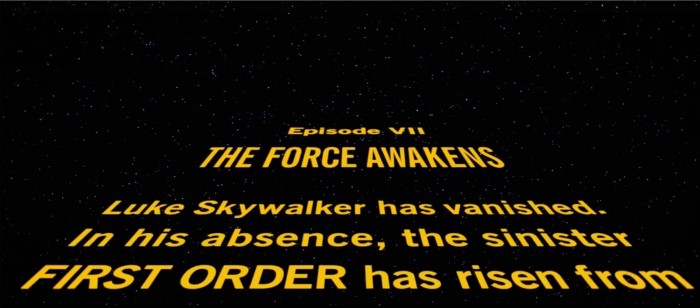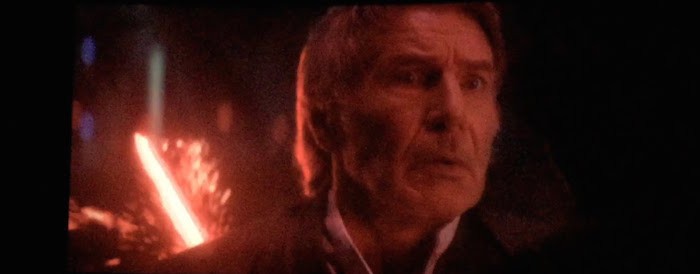'Harry Potter,' 'Star Wars,' And The Death Of The Happy Ending
This post contains spoilers for Star Wars: The Force Awakens and Harry Potter and the Cursed Child.
We live in an age where pop culture never dies.
No one mourns the loss of a beloved show – they wait for Netflix or Amazon to rescue it. Beloved movies from decades past are granted sequels that double as soft reboots. If something does come to a definitive end, you can always count on the comic book series to fill in the narrative gaps, or the fan conventions that keep the spirit alive. Nearly 50 years ago, a letter-writing campaign saved Star Trek from cancellation after its second season. Today, it's hard to imagine anything with a passionate following completely slipping through the cracks. It will find a way to live on, to endure. We don't need to fight for what we love anymore, because everything finds a way of staging a return.
And the past year has seen the return of two of the most popular titles in recent pop culture history. Last December, Star Wars: The Force Awakens opened to record-breaking box office. More recently, Harry Potter and the Cursed Child opened on the London stage, continuing the former boy wizard's adventures in a new medium while fans snatched up millions of copies of the play itself. And while one of these is a space opera and the other a fantasy tale of magic, these projects have a great deal in common. They're bound not by creators or parent companies or even the same audience, necessarily. They're bound by similar intentions and goals and executions.
Most importantly, they both take the concept of a happy ending behind the shed and shoot it dead.
Happily Never After
You remember the end of Return of the Jedi. The second Death Star has been destroyed, the Emperor is dead, Darth Vader has been redeemed, Han Solo and Leia are finally ready to get it on, and everyone is all smiles. Their victory over the Empire is presented as an absolute. It's time to relax in a treehouse city and sing Yub Nub with a bunch of flesh-eating, droid-worshipping teddy bears who aren't that bad once you get to know 'em.
You remember the end of Harry Potter and the Deathly Hallows. Voldemort is dead, Hogwarts (while devastated) still stands, the main characters all conveniently split up into couples, and the Elder Wand is no longer a threat to all magical and muggle life. In the epilogue, a grown Harry has a heart-to-heart with his middle child, Albus, telling him that it's totally okay if he gets sorted into Slytherin. After all, "the bravest man he had ever met" came from Slytherin. His scar hasn't hurt in 19 years. Everything is peachy. Everything is fine. The book literally ends with the words "All was well."
Star Wars: The Force Awakens let viewers live with that happy ending for over thirty years before it soaked it in gasoline and lit a match. J.K. Rowling's readers got less than a decade to imagine Harry Potter enjoying an unexciting life before Harry Potter and the Cursed Child destabilized his entire existence yet again. These chapters don't simply introduce another chapter in their respective sagas. They go out of their way to pull the rug out from under the original ending. It's not enough for these characters to have another adventure – the "Happily Ever Afters" they previously experienced have to be hollowed out, transformed into temporary respites from pain and suffering.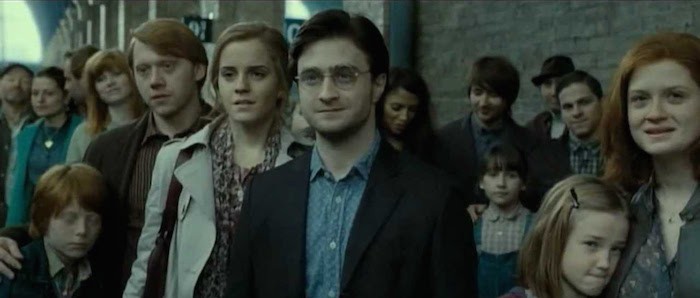
In The Force Awakens, we realize that conflict continued following the Battle of Endor, that many more people died, and that the embers of the Empire continued to burn before reigniting in the roaring fire that is the First Order. Han and Leia are no longer together, with the former retreating to his smuggler ways and the latter fighting a never-ending battle that has taken an obvious toll on her. Their son has turned evil. Luke Skywalker has simply vanished. Even R2-D2 has become a shadow, deactivating himself and remaining idle for years. That final tableau in the Ewok Village has been shattered. It's no longer a promise of the future, but a snapshot of a single happy moment that didn't last long at all.
Harry Potter and the Cursed Child is a less grand in its disruption of Deathly Hallows' happy ending, but its personal nature cuts a little deeper. Because Albus Potter is sorted into Slytherin and despite the assurances from his father, everything is most certainly not okay. Unlike his dad, Albus hates Hogwarts and is a thoroughly miserable outcast. Harry, despite his best efforts, is far from Father of the Year and completely fails to address the emotional needs of his son. The epilogue of the final Harry Potter novel promised that the title character was older and wiser, that his experiences had prepared him for the complicated world of adulthood and fatherhood. The Cursed Child reveals that he's in over his head, out of his league, and unprepared at best. Send Harry on an adventure and he gets the job done. Ask him to reason with a son he can't connect to in any way and watch him struggle. Oh, and his scar is hurting again, because of course it is.
However, neither The Force Awakens or The Cursed Child is cruel for the sake of being cruel. These daggers to the heart are carefully calibrated. This is pain at its most efficient. Because if the Star Wars saga and J.K. Rowling's Wizarding World are going to live on forever, if they are going to keep on producing new stories for decades to come, happiness needs to die. Great serialized storytelling never comes from people getting along and being happy. If you want to build a story, you need to regularly burn everything down.
Pain, Drama, and the Ongoing Franchise
I liked Star Wars: The Force Awakens and I liked Harry Potter and the Cursed Child, both of which scratch a familiar itch and do so with a unique energy that is both fresh and familiar. But they both hurt and they both leave their respective universes messier than they were before. Both film and play seem to have a single goal in mind: how do we create enough disarray to generate drama for the foreseeable future?
The Force Awakens is a bittersweet film: Han Solo is dead, but Starkiller Base has been destroyed. Ben Solo is still a servant to the Dark Side, but Rey has managed to track down Luke Skywalker. The Cursed Child reaches a similarly unsure place in its final pages: Voldemort has an evil daughter, but she's locked up (for now). After all kinds of time travel shenanigans, the timeline has been fixed, but Harry's parents and Cedric Diggory (and countless others) are still dead. Harry and Albus have the conversation they've needed to have for a long time, but the healing process has barely begun. Everyone hurts.
It's easy to have a cynical reading of this. Of course The Force Awakens will end like this! Star Wars: Episode 8 is on the way and Star Wars: Episode 9 is already in the pipeline. And while there hasn't been any buzz about a direct sequel to The Cursed Child, the fact that the Harry Potter series is getting its own spin-off in this year's Fantastic Beasts and Where to Find Them (to say nothing of the enormously popular theme park attractions Universal Studios has been building all over the world) is all the evidence you need to know that Rowling and her collaborators aren't finished with this world quite yet. Both of these new entries are here to feed the beast of fandom while keeping them hungry. Here's a taste of what you love. Just remember that there's more where that came from.
But let's just be honest for a moment here: the taste we are granted, from both Star Wars and Harry Potter, is nothing short of delicious. The Force Awakens is a fast and colorful delight, a film with such momentum and charm and wit that it's easy to forgive its numerous flaws. It's a cinematic warm hug from an old friend. The Cursed Child is more melancholy, but it's a surprisingly sobering examination of what happens when your promising childhood gives way to an adulthood where you can't stop letting everyone, including yourself, down at every turn. The Potter fans who have aged into adults and parents over the past decade may have the wind knocked out of them by this play. I know I was gutted.
So while you can point at the transparent attempt of both The Force Awakens and The Cursed Child to elongate seemingly finished franchises, these aren't simple victory laps. Neither of them feels tired and or unnecessary. This is brand extension in the most interesting way possible. These are sequels that aren't afraid to burn bridges. These are massive franchises whose shepherds recognize that drama, the pain that accompanies it, is key to keeping the fans invested. And I can't help but be okay with that.
Everything is Different, Everything is the Same
But for everything they do right and everything they do different, neither Star Wars: The Force Awakens nor Harry Potter and the Cursed Child is immune to nostalgia. Both are similar in ways that go beyond their rejection of a happy ending and both seem to suggest a future model for all major serialized storytelling. Or franchises. Or whichever other word we want to use here.
The Cursed Child is actively and openly obsessed with the past. Once the major players have been introduced and re-introduced, it quickly gets down to business: it's a time travel story, a look at what happens when Albus Potter and his best friend Scorpius Malfoy use one of the few remaining Time Turners to return to the events of Harry Potter and the Goblet of Fire so they can fix one of Harry's few major mistakes. They're going to save Cedric Diggory...and they're going to fail several times, forcing them to frequently revisit key scenes from the fourth book from a new perspective. Eventually, the time travel shenanigans throw history out of whack, leading to a new present where Voldemort won, Harry Potter is dead, and, wouldn't you know it, fan-favorite characters like Severus Snape get to show up to remind us that we like them so much!
Snape is the melted Darth Vader helmet of The Cursed Child – here's something very popular that will get you talking and make you excited and inspire all kinds of feelings to crawl out of your chest despite not adding that much to the actual plot of the story. In other words, it's fan service.
The Force Awakens is also connected at the hip to previous Star Wars adventures, but unlike Harry Potter, the constant revisiting of past storylines isn't literal. Instead, the way the film echoes the plot of the original 1977 Star Wars is treated like one massive Easter egg. You notice it. It kicks up that nostalgic dust. You feel good. And then you feel bad later when you realize that the new aspects of the film, the stuff that has no direct connection to the past movies, are the strongest elements. The Force Awakens doesn't actively and literally revisit the past, but it might as well: there's a desert planet, a scrappy young hero, a cynical mentor, a dingy alien bar, and a desperate assault against a super-weapon.
The way that both The Force Awakens and The Cursed Child lean on their own series' history can be frustrating, especially since both function without needing those nostalgic triggers. They want to have their cake and eat it, too. They'll burn down those happy endings, but they'll also pause a few too many times to comment "Hey, remember when such-and-such happened? That was pretty cool, right?" It's frustrating to watch two worlds with infinite possibilities barrel toward the future while remaining so closely tethered to the past. Star Wars and Harry Potter are bigger than our old memories. They are universes built create new ones.
New Blood
While Star Wars: The Force Awakens and Harry Potter and the Cursed Child share the same weakness for nostalgia, they also share the same strength. The best characters in The Force Awakens and The Cursed Child are not the old-timers being trotted out for another round, they're the new people. The young blood.
It's nice to see Han Solo again, but it's Rey, Finn, and Poe Dameron who actually leave a lasting impression. It's great to catch up with Harry and Ron and Hermione, but Albus Potter and Scorpio Malfoy (especially Scorpio Malfoy) are the actual leads of The Cursed Child and leave a much stronger impression. By now, it's hard for Harry or Han to do anything too out of the ordinary. They've been around long enough to become fully formed. They can delight us, but they cannot surprise us. The best parts in both The Cursed Child and The Force Awakens involve discovering these newbies and learning what they're all about. Albus and Scorpius are so different from their parents that their new adventures take on a fresh flavor. Their interactions are unique and often inspired and their bromance, brewed in a vat of mutual loneliness, is very different than the Harry/Ron/Hermione dynamic. Finn, Rey, and Poe are a triumph of casting, with John Boyega, Daisy Ridley, and Oscar Isaac bringing a fresh energy to a movie that is otherwise in love with its past.
It's as if The Force Awakens and The Cursed Child want to hand the torch off to the next generation, but they can't quite commit. They're hesitant to let the popularity of their world do the heavy lifting. If we're going to love to Rey and Scorpius, if we're going to want to see what happens to Finn and Albus next, they need to be placed in a cast surrounded by older faces and in a story that directly and actively connects them to famous moments from adventures they weren't alive to see.
And this probably won't be limited to these two series, either. Just look to the upcoming Blade Runner sequel, which sees Harrison Ford returning as Rick Deckard...while adding Ryan Gosling as the new guy who will probably have far more to do.
How to Build a Universe
Go grab your copy of Harry Potter and the Cursed Child (I know you have one) and flip it over. Note the logo above the barcode: a "WW" in that distinctive Harry Potter font, circled with the words "J.K. Rowling's Wizarding World." Keep your eyes open. We're probably going to be seeing a lot of this.
J.K. Rowling didn't write the actual script for Harry Potter and the Cursed Child – she shares story credit with the show's director John Tiffany and playwright Jack Thorne, who actually wrote the show. But this little logo, this simple "WW," speaks volumes. While Rowling still has final approval over what goes into her meticulously crafted world (she wrote the screenplay for Fantastic Beasts and Where to Find Them), she's not above farming out the heavy lifting. She's willing to let other people play in her sandbox. J.K. Rowling isn't the brand. "J.K. Rowling's Wizarding World" is the brand and there's a strong chance it will outlive her.
Star Wars will undoubtedly outlive George Lucas, who sold his baby to Disney and went off to retire in a house constructed entirely out of stacks of cash a few years ago. Under the supervision of Lucasfilm president Kathleen Kennedy, Star Wars has become more active than ever, with a new movie arriving every year, Marvel publishing several in-canon ongoing series, Star Wars Rebels winning acclaim on the small screen, and new novels arriving on a regular basis to fill in the blank spots between movies. Lucasfilm infamously wiped out the Star Wars Expanded Universe a few years back, giving them a clean slate, a new foundation. Longtime fans were despondent, but let's face facts: it's hard to keep a universe in motion, to keep on making new movies, when you have to take several decades of books and comics and video games into account.
Much like how Rowling oversees her Wizarding World with an iron fist, Star Wars has the Lucasfilm story group, who are tasked with making sure that every new movie, television episode, comic, and book makes sense within the new canon. It's not just that Star Wars is back and bigger than ever – it's that the entire saga is now meticulously overseen in a way that it hasn't been in the past. It was okay to be a casual Star Wars fan before 2012. Now, Lucasfilm is doing everything it can to make sure that each new book and every new show is required. It's about the big picture now. It's about the universe. Every nook and cranny of the canon, every spin-off and side story, used to be the realm of the uber-nerd. It was niche territory for fringe fans. The completionists.
Now, canon is carefully controlled as part of a corporate mandate. No one gets that happy ending because that would imply a closed book and a closed book implies a conclusion and a conclusion implies the end of something profitable and popular. This means Star Wars and Harry Potter will continue indefinitely, but it also (hopefully) means a greater attention to quality. If something begins to smell a little too rotten for a little too wrong, this whole system simply breaks down.
The Death of the Ending
It's a good time to be a fan. Sure, there are always going to the loudmouths, the elitists, the jerks who think critics are simply out to hate whatever they love, but there has never been a better time to deeply and genuinely love a book, film, or television series. As long as you keep showing up, they'll keep making it. And as long as it's still good, you'll keep showing up. It's actually a nice little cycle, albeit one that requires fans to actually judge the things they love without blinders and acknowledge that a movie or book that bears the name of a character or a universe they love is fundamentally broken (but that's a conversation for another day).
But that cycle comes at a cost to the characters we cherish so much. As long as we're engaged, as long as we're reading and watching, our heroes are never going find peace. They're never going to be happy. Our love for Harry Potter doomed him to be a shitty father. We love Han Solo so much that he had to come back, just to get murdered by his own son. I think about that scene in The Avengers where the heroes all enjoy lunch at a shawarma place after the Battle of New York and how it inspired so many memes. I think about that extended party sequence in Avengers: Age of Ultron, where so much charm and comedy is mined out of these characters sitting around, enjoying each other's company and being happy. Then Age of Ultron throws its characters into a meat grinder, destroying friendships and tearing the team apart.
That's the way it should be. In fiction (especially genre fiction), happiness can mean complacency. It means reverting to a status quo. It means Han and Luke and Leia remaining Best Friends Forever and having repetitive adventures in a galaxy they saved or Harry Potter and Ginny Weasley having a dull marriage where everything goes right and they never come into conflict with evil again. Most of all, it means the death of drama. It means embracing comfort over surprise, pleasantries over development.
This is the new model for this kind of serialized storytelling: make it hurt so much, so often that it's impossible for anything to grow stale. The happy ending must die for the story to live.

